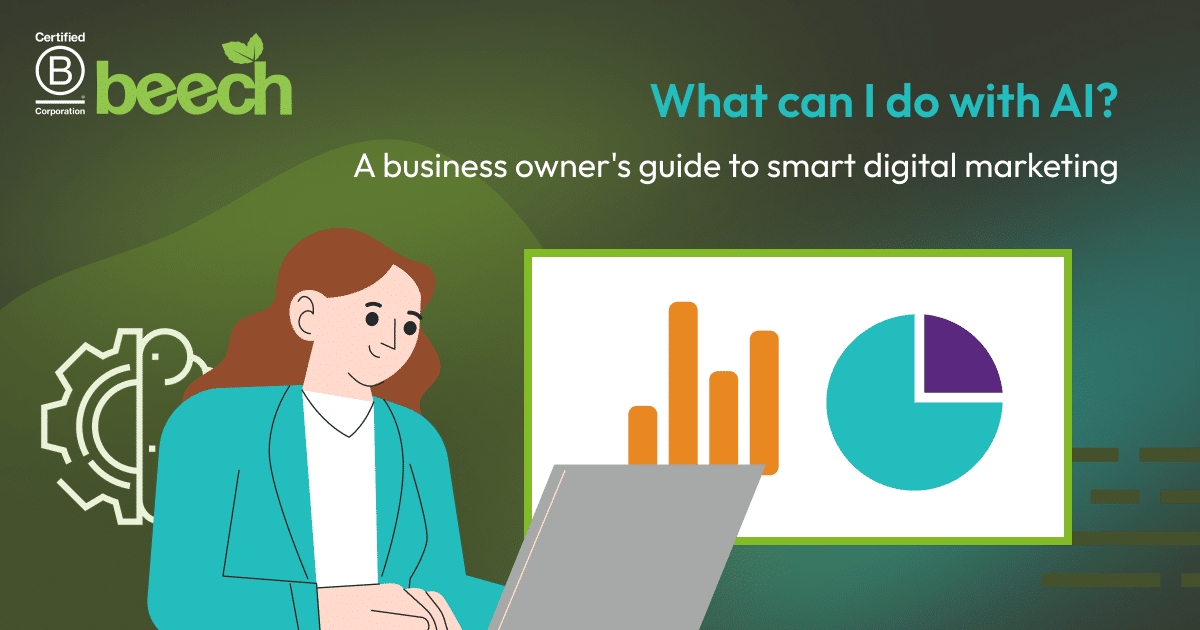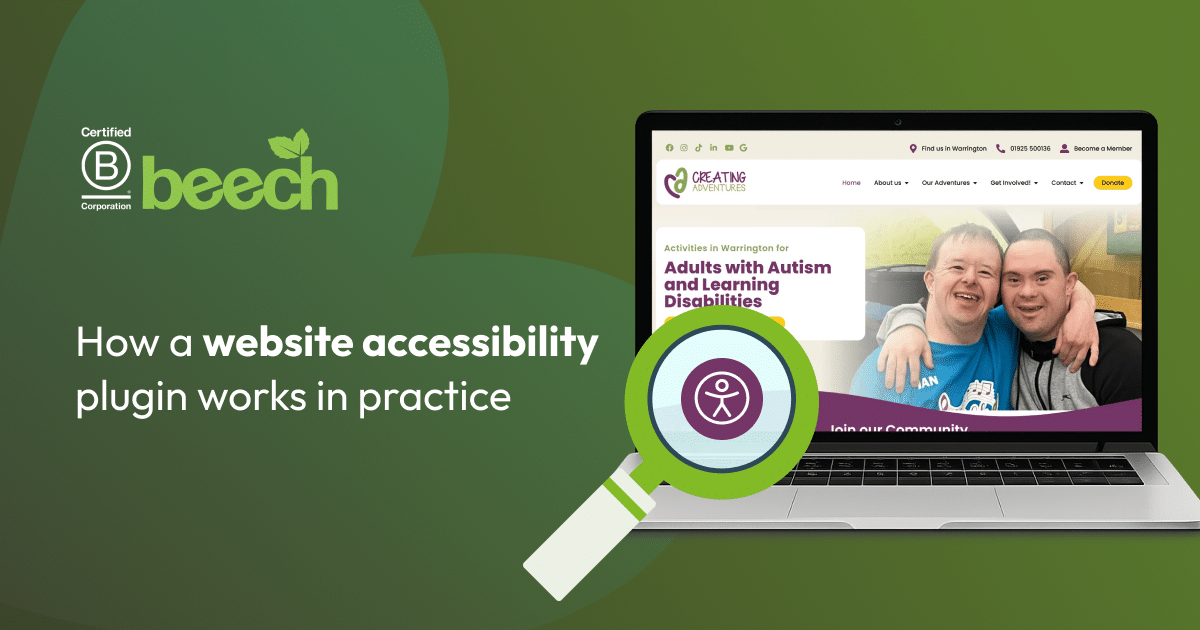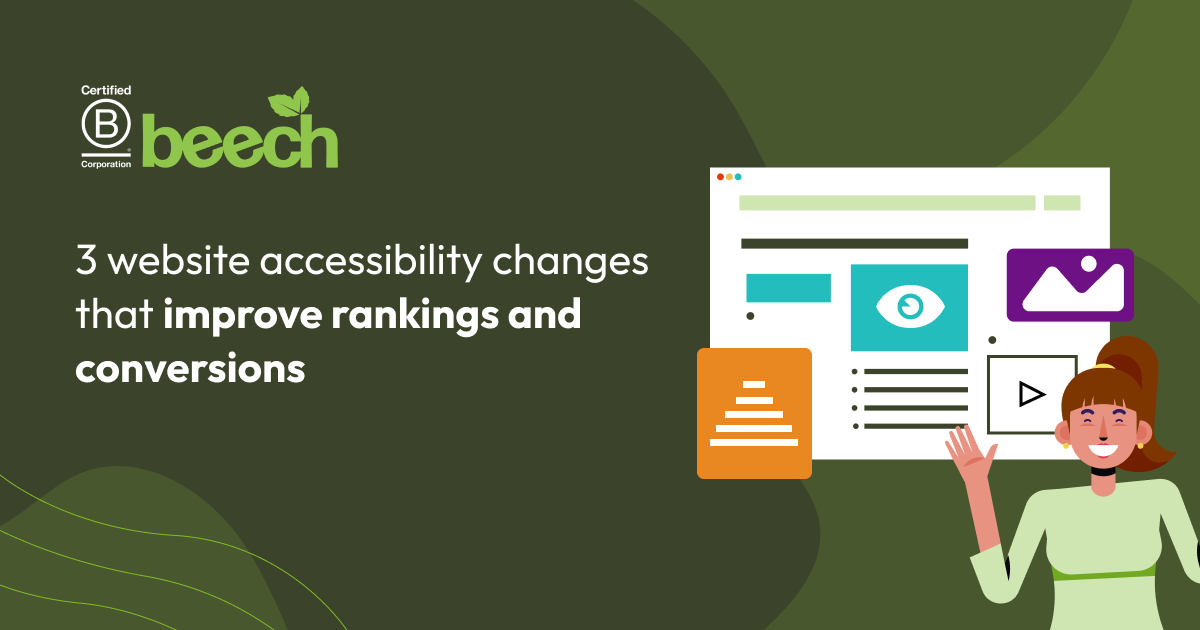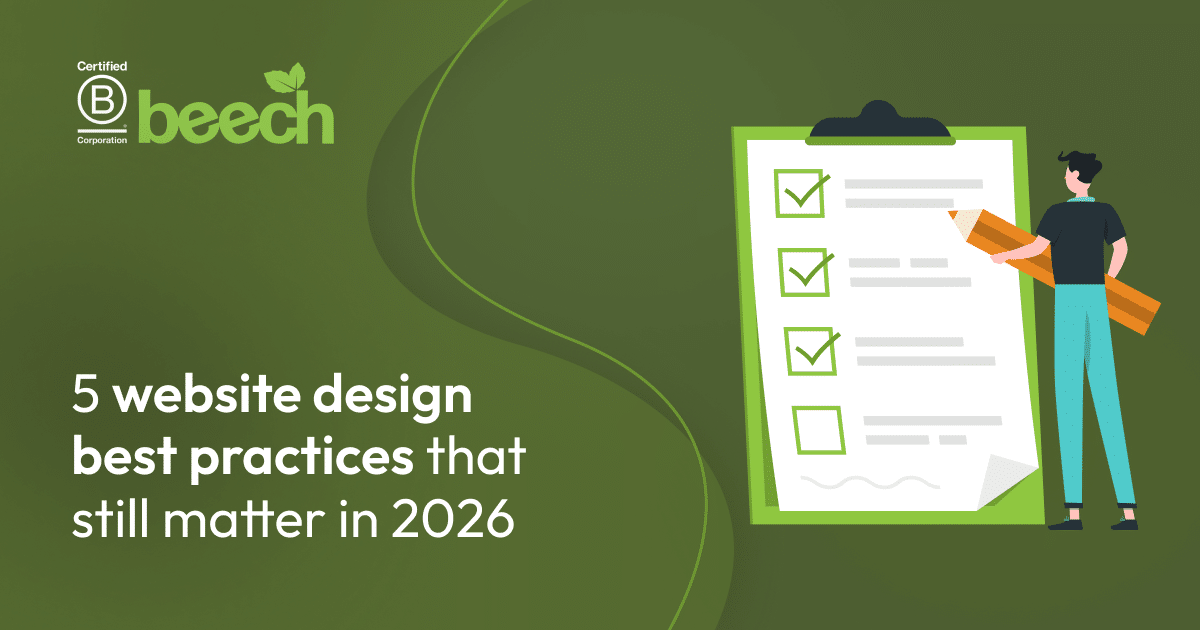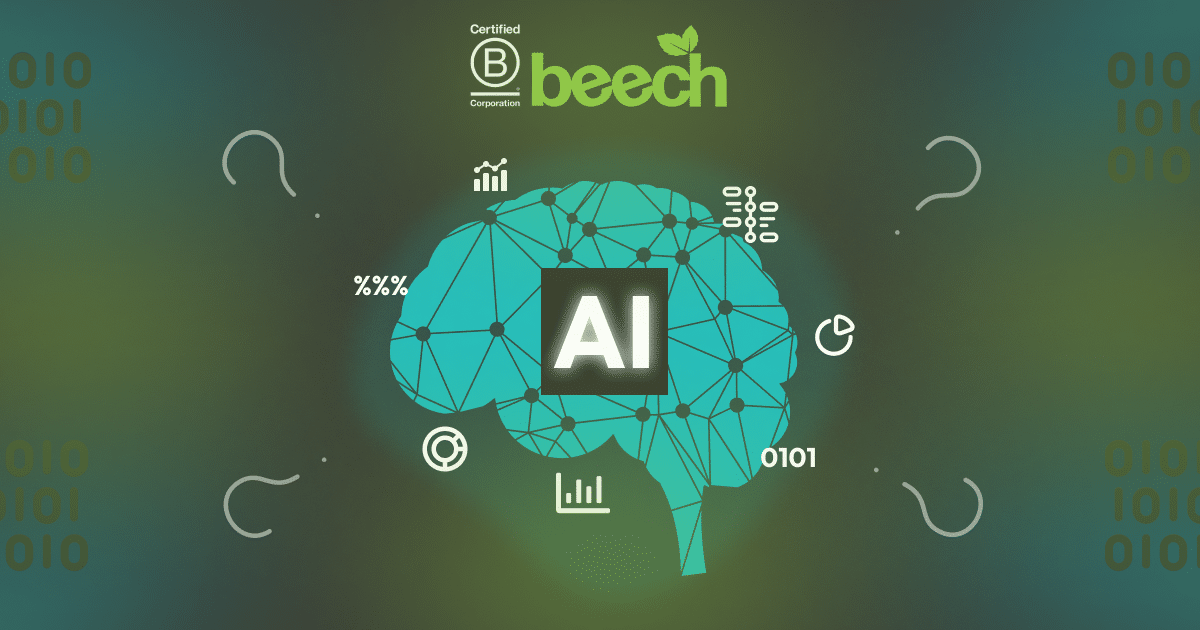If you’re running a business in 2025, you’ve probably heard the term “AI” more times than you can remember. Artificial Intelligence or AI, as it’s known, is changing how we operate online, but it’s also surrounded by hype.
The real question isn’t whether AI is powerful—it clearly is—but rather how to use it alongside professional expertise to grow our marketing and reach more customers.
The honest answer? When used strategically, AI helps teams work smarter and faster.
But smart marketing still requires strategic thinking, deep industry knowledge, and creative direction from people who understand the business.
For digital marketers and business owners, the winning approach combines AI efficiency with expert insight. The key is knowing where each adds value.
In this guide, we’ll explore how AI fits into effective digital marketing strategy, which approaches deliver real results, and why the blend of technology and expertise matters most.
1. Understanding what AI can actually do
Without talking about specific applications, let’s get clear on what AI is, and what it isn’t.
AI excels at pattern recognition, data processing, and handling repetitive tasks. It can analyse customer information quickly, spot trends in marketing performance, and automate routine work.
And with all this, AI is most effective when strategists and marketers use it to do their jobs better, using faster research techniques, deeper insights, and quicker iteration. It’s a tool that amplifies expertise but doesn’t replace it.
Where AI adds real value in marketing:
- Faster data analysis: When needing to understand marketing performance, AI can process months of data quickly and surface important patterns.
- Quicker research: Instead of spending days researching market trends or customer preferences, AI can accelerate the research process, giving teams more time to synthesise findings and build a strategy (which AI can also be used for!).
- Rapid testing and iteration: AI can help create variations of a marketing approach and test them quickly. The team can then review results and make strategic decisions about which direction to pursue.
- Routine task automation: Scheduling posts, organising data, generating reports, and more of these repetitive tasks can be handled efficiently, freeing teams to focus on quality and creativity.
The most successful businesses aren’t choosing between “use AI” or “use professionals”, they’re doing both. They’re using AI to handle the heavy lifting on routine tasks, freeing up their own team, or the time of their trusted agency partners, to focus on creativity and decision-making.
As an example, a professional writer can use AI to help research a topic or draft initial ideas, meaning they spend more time checking the outcome, proofreading and perfecting the final piece against internal quality standards rather than staring at a blank page, which is where the real value comes from.
2. AI for data analysis and insights
Most business owners and marketing teams have access to more data than they realise, including website analytics, customer behaviour patterns, sales trends, marketing performance. But data sitting in a spreadsheet isn’t easy to utilise, so understanding what it means is a great way for businesses to make the most of their insights.
So, use AI to make sense of your data for you.
AI can process your marketing data and surface insights faster than manual analysis. It can identify patterns in campaign performance, customer segments, and audience behaviour. Then, a marketing team can interpret these insights and build around what they reveal.
Here’s what AI can do for data analysis:
- Spot patterns you could miss: AI can analyse months of customer data and tell us exactly which types of customers are most likely to make a purchase, when they’re most likely to engage, and what messaging resonates with them. This all contributes toward a customer persona that can be considered in future marketing activities.
- Predict future trends: By looking at historical patterns, AI tools can forecast demand, help anticipate seasonal changes, or identify emerging customer needs before competitors do. It can also help spot upcoming online trends, including on social media, helping teams stay ahead.
- Automate reporting: Instead of spending hours pulling together monthly performance reports, AI can generate insights automatically, allowing more time to act on those insights rather than just collect them.
To get started, try connecting data analysis tools to AI models directly. Many AI tools integrate directly with Google Analytics 4, using integration tools such as Zapier.
Remember: When putting data into AI, make sure it’s stripped of personal data and customer details, to stay UK GDPR compliant.
Google’s AI tools, such as Gemini, for example, can help with understanding how people are searching for products or services, which means we can optimise an online presence to meet people where they’re already looking.
Start by asking: “What patterns are hiding in our data that we haven’t noticed yet?” The results may be surprising!
3. AI for content research and strategy
Content is the foundation of digital marketing, including how we attract customers, build trust, and communicate value. Creating effective content requires both strategic thinking and efficient execution.
But creating good content is time-consuming, and AI can help massively.
Ways AI can improve content research and strategy
Research topics faster:
Instead of spending hours reading articles and reports, AI tools can summarise industry trends, competitor approaches, and what customers are searching for.
We’d recommend tools like Google’s Notebook, which will not only read a report or website article, but provide overviews, mind maps and excerpts that you can use in content. For this tool, remember to always check usage permission when uploading content to the Notebook, and abide by Google’s policies.
Understand an audience better:
AI can analyse what content customers engage with, what questions they’re asking, and what language resonates with them. This understanding helps to create content that connects with audiences and drives more interaction with a brand.
Discover content opportunities:
AI tools can identify online trending topics in specific industries, show what competitors are talking about, and highlight questions customers are searching for but not finding answers to. This all contributes to a marketing strategy and has a ripple effect on the type of content we put out there!
Optimise for search:
AI can help ensure content is structured in a way that search engines, and increasingly, AI Overviews, understand and rank highly
AI is excellent at research and structure and can also be complementary when deciding what story a business should tell, how to differentiate from competitors, and why that message matters to a specific audience.
4. AI for efficiency and automation marketing
Email remains one of the highest-ROI digital marketing channels. Effective email marketing requires understanding the audience, crafting relevant messages, and continuously optimising based on performance.
And now, modern email marketing combines audience insights with AI-assisted optimisation and automations.
Using AI in email marketing offers:
- Intelligent segmentation: Understanding who customers are and what they need requires strategy. AI can help execute that strategy, organising customers by behaviour and preferences, so different segments receive relevant messaging.
- Personalisation in campaigns: Once it’s determined what each customer segment needs to hear, AI can help personalise messages, offers, and timing.
- Performance testing: Decide what to test, including subject lines, messaging angles, or offers, and AI runs these tests and surfaces results.
- Optimal timing: AI can analyse when each customer segment is most likely to engage, meaning we have help with when and how to deliver it.
- Predictive insights: AI can identify which customers are at risk of leaving, suggesting that the team should invest in re-engagement, which then leads to a new approach.
Another bonus? Repetitive work is AI’s sweet spot. Email sorting, scheduling, data entry, basic customer service questions, meeting summaries—all the tasks we don’t want to spend time on. AI tools handle these exceptionally well, which means the team can focus on work that requires their expertise and creativity.
Where AI saves time the most:
Scheduling and calendar management: AI can look at multiple calendars, find meeting times that work for everyone, and handle the back-and-forth.
Email management: AI can sort, prioritise, and draft responses to routine enquiries, meaning teams deal with only the messages that genuinely need specialised attention.
Meeting preparation: AI can transcribe those lengthy marketing meetings, summarise key points, assign action items to the right teams, and distribute notes automatically. We’d recommend Zoom’s smart recording companion for this.
Why this matters: A team’s time is the most valuable resource. Every hour spent on administrative work is an hour not spent on marketing, relationship-building, or creating something valuable for customers.
To get started: Audit how the team spends their week. Where are people doing repetitive, predictable tasks? Start with one or two tools and let the team adapt before adding more.
5. AI for understanding customers
Perhaps the most strategically valuable use of AI is understanding what customers want and why they want it. In digital marketing, understanding customers is essential, and AI can help us better understand customers by:
- Analysing feedback: If there are customer reviews, survey responses, or social media mentions, AI can read through hundreds or thousands of them and identify the themes that matter most. What frustrates people? What do they love? What are they asking for?
- Segmenting your audience intelligently: Rather than guessing who customers are, AI can analyse behaviour patterns and automatically create customer segments based on real data, making marketing more targeted and relevant.
- Predicting needs: By looking at customer behaviour patterns, for example, how they interact on social media, AI can sometimes identify what someone needs before they’ve even searched for it.
- Personalising experiences: AI can help deliver personalised experiences, including different messages to different customer segments, content recommendations based on behaviour, and offers tailored to preferences delivered by a range of online methods.
When we understand customers at a higher level, the entire business becomes more responsive and customer-focused.
Start regularly collecting feedback, like customer reviews, survey responses and support conversations. Then use an AI tool to analyse that feedback and identify the top themes.

6. Getting started with a practical guide
How to actually start using AI effectively in marketing?
Step 1: Get clear on your marketing strategy: Without implementing any tools, first, be clear about the core strategy. Who are we trying to reach? What’s the core message? What sets us apart? This clarity guides which tools and approaches make sense.
Step 2: Research the right tool: There are AI tools for almost everything, but not all of them are as effective. Look for tools specifically designed for the industry or marketing requirement, read reviews from people using them, and check if they integrate with tools already in use.
Some of the tools we’d recommend include Claude, Gemini and Copilot.
Step 3: Start small: Don’t overhaul all marketing at once. Try one tool with one specific task, for example, email optimisation, and learn how to use it.
Step 4: Measure and refine: Track whether the tool actually saves time or improves results. If it does, expand its use. If not, try a different approach. Marketing is continuously evolving, so regular evaluation matters.
Step 5: Keep humans in the loop: Successful implementation requires the team to understand the tools and buy into how they work. Include them in the process rather than imposing new tools on them.
Step 6: Stay updated: AI tools are evolving incredibly fast. What’s available now might be outdated in six months. Experiment, and don’t be afraid to try new approaches.
7. The strategy still matters
Something that won’t change is that having a clear business strategy still matters more than having the fanciest tools.
AI can help with executing a strategy more effectively, give better data, faster insights, and more efficiency. But the strategic decisions, such as positioning, core messaging, audience selection and competitive differentiation, should still keep human judgment, market knowledge, and business insight in the process to get the best out of the results.
This could be an internal team, or a trusted agency partner like us with shared values.
The most successful businesses we see aren’t the ones chasing every new AI trend. They’re the ones using AI strategically, in specific areas where it adds value, staying focused on their core strategy and customers.
Conclusion: AI as your business partner
AI is time-saving, can help with understanding customers better, improve decision-making, and make digital marketing more efficient. But it works best when it’s treated as a tool that amplifies human expertise, not replaces it.
The question isn’t really “What can I do with AI?” It’s “Where can AI help my marketing work smarter, so my team can focus on what matters?”
If you’re not sure where to start or want to explore how AI might fit into a broader digital marketing strategy, book a call with Roz to discuss what could work for your organisation.
In the meantime, pick one area, whether it be data analysis, content research, or efficiency, and start experimenting. Let us know how you get on!



